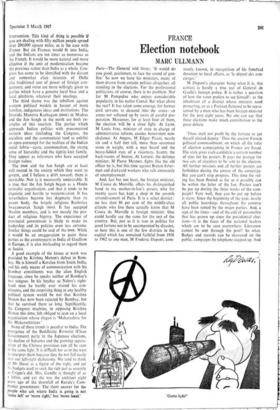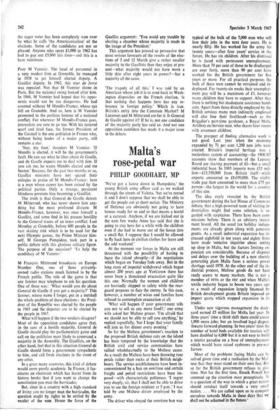Election notebook
FRANCE MARC ULLMANN
Paris—The General told them : 'It would do you good, gentlemen, to face the sound of gun- fire.' So now we have his ministers, many of them drawn from outside politics altogether, all standing in the elections. For the professional politicians, of course, there is no problem. Nor for M Pompidou who enjoys considerable popularity in his native Cantal. But what about the rest? It has taken some courage for former civil servants to descend into the arena—an arena not softened up by years of careful pre- paration. Moreover, for at least four of them, the election will be a close fight. At Lyon, M Louis Joxe, minister of state in charge of administrative reform, exudes benevolent non- chalance. At Angers, M Edgar Pisani, nearly six and a half feet tall, more than seventeen stone in weight, with a neat beard and the heavy-lidded eyes of a visionary, haunts the back-rooms of bistros. At Lorient, the defence minister, M Pierre Mesmer, fights like the old officer he is, but this time against Breton fisher- men and dockyard workers who talk ominously of unemployment.
And, last but not least, the foreign minister, M Couve de Murville, offers his distinguished hand to my mother-in-law's grocer, who for twenty years has kept a shop in the seventh arrondissement of Paris. It is a select district: no less than 86 per cent of the middle-class citizens who live there actually know that M Couve de Murville is foreign minister. One could hardly say the same for the rest of the country. But, just as it is rare in politics for good fortune not to be accompanied by disaster, so here this is one of the few districts in the capital which has remained faithful from 1936 to 1962 to one man, M Frederic Dupont, corn- monly known, in recognition of his fanatical devotion to local affairs, as 'le deput6 des con- cierges.'
M Dupont's character being what it is, this contest is hardly a true test of General de Gaulle's foreign policy. It is rather a question of how the voter prefers to see himself : as the inhabitant of a district whose interests need protecting, or as a Parisian flattered to be repre- sented by a man who has been foreign minister for the past eight years. No one can say that these elections make much contribution to the great debate.
`Thou shalt not profit by thy fortune to get thyself elected deputy.' Thus the ancient French political commandment, on which all the rules of election campaigning in France are based. The state gives each candidate a certain number of sites for his posters. It pays the postage for two sets of circulars to be sent to the electors. All further missives and all further posters are forbidden during the course of the campaign. But you can't stop progress. This time the rul- ing has been flouted as far as it possibly can be within the letter of the law. Posters can't be put up during the three weeks of the cam- paign? Very well, they can be put up before it starts. Since the beginning of the year, nearly all public hoardings throughout the country have been rented by the major parties. And, a sign of the times—and of the cult of personality that has grown up since the presidential elec- tions—it is the faces of the national leaders which are to be seen everywhere. Literature cannot be sent through the post? So what. Badges and records can be showered on the public, campaigns by telephone stepped up. And
'Gotta light?'
the eager voter has been completely won over by what he calls 'the Americanisation' of the elections. Some of the candidates are not so pleased. Anyone who spent 11,000 in 1962 has had to pay out £5,000 this time—and this is a bare minimum.
Poor M Vannier. The head of personnel in a very modest firm at Grenoble, he managed in 1958 to get himself elected deputy. A Gaullist deputy. In 1962, this tour de force was repeated. Not that M Vannier shone in Paris. But the national swing looked after him. In 1966, M Vannier had hoped that his oppo- nents would not be too dangerous. He had counted without M Mendes-France, whose eye fell on Grenoble. And so, here is M Vannier promoted to the perilous honour of a national conflict. For wherever M Mendes-France goes, journalists are sure to go too. With his tattered scarf and tired face, the former President of the Council is the one politician in France who, without being leader of a major party, still remains a star.
'Star, my foot,' thunders M Vannier. 'If Mendes is elected, it will be the government's fault. He can say what he likes about de Gaulle, and de Gaulle expects me to deal with him. If you ask me, he wants Mendes elected and me beaten.' Because, for the past two months or so, Gaullist ministers have not spared their eulogies in praise of M Mendes-France: here is a man whose career has been ruined by the political parties. Only a strange, persistent blindness prevents him becoming a Gaullist.
The truth is that General de Gaulle detests M Mitterand, who has never shown him any- thing but the most profound distaste. M Mendes-France, however, was once himself a Gaullist, and some find in his present hostility to the General traces of an inner conflict. Last Monday at Grenoble, before 600 people in the vast skating rink which is to be used for the next Olympic games, the Prime Minister him- self, M Georges Pompidou, took part in a public debate with this glorious solitary figure. The purpose of the occasion? 'To help the candidacy of M Vannier.'
M Francois Mitterand broadcasts on Europe Number One, one of three privately- owned radio stations much listened to by the French public. The rule of the game is that any listener may telephone to ask his question. One of these was : 'What would you do about General de Gaulle if you got a majority?' This listener, whose name I forget, put in a nutshell the whole problem of these elections : the Presi- dent of the Republic was elected by the people in 1965 and the deputies are to be elected by the people in 1967.
What will happen if the two verdicts disagree? Most of the opposition candidates agree that, in the case of a hostile majority, General de Gaulle should play the parliamentary game and call on the politician most likely to command a majority in the Assembly. The Gaullists, on the other hand, feel that in this situation General de Gaulle should form a government sympathetic to him, and call fresh elections in the event of any crisis.
In a great many countries, this kind of debate would seem purely academic. In France, it fas- cinates an electorate which has learnt from its history books that if you want to change the constitution you man the barricades.
But, since in a country with a high standard of living you no longer man the barricades, the question ought by rights to be settled by the verdict of the vote. Hence the force of the Gaullist argument: 'You avoid any trouble by electing a chamber whose majority is made in the image of the President.'
This argument has proved so persuasive that most serious forecasts of the results of the elec- tions of 5 and 12 March give a rather smaller majority to the Gaullists than they enjoy at pre- sent—what majority would not have worn a little thin after eight years in power?—but a majority all the same.
'The tragedy of all this,' I was told by an American whose job it is to send back to Wash- ington dispatches on the French election, 'is that nothing that happens here has any re- levance to foreign policy.' Which is true. Britain's entry into the Common Market? M Lacanuet and M Mitterand are for it. Is General de Gaulle against it? If he is, not one candidate of the majority party has said so. And not one opposition candidate has made it a major issue in the debate.



































 Previous page
Previous page